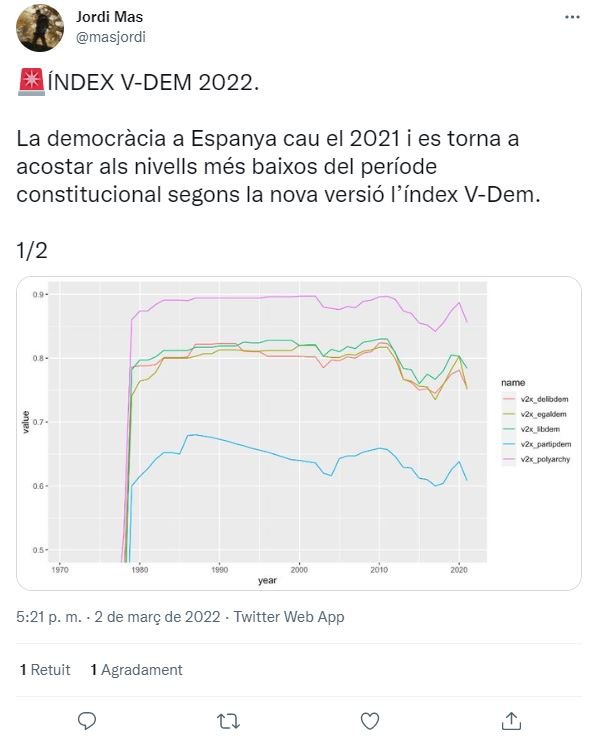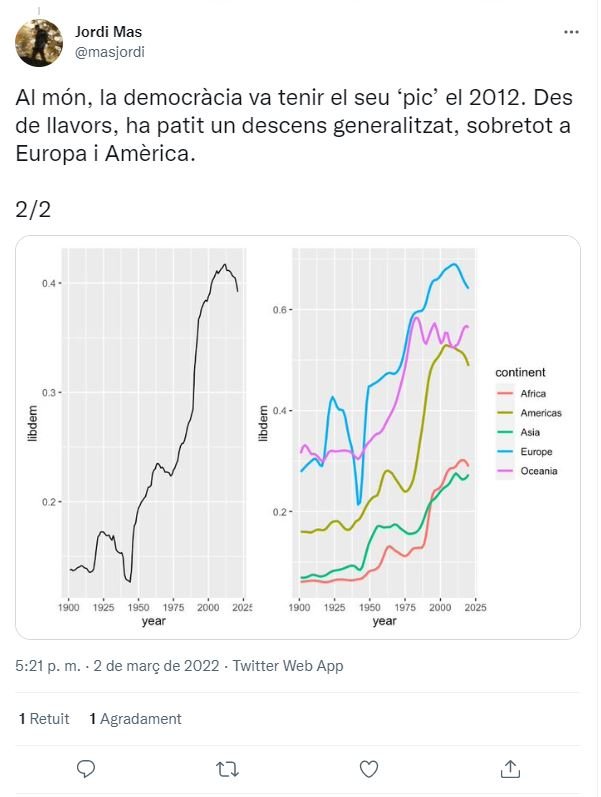Democracy is becoming increasingly degraded in Spain. That is the finding highlighted by the latest edition of the Varieties of Democracy (V-Dem) index: levels of democratic quality have fallen to almost the lowest level in the whole of Spain's 45-year constitutional era - that low point having arrived in 2017, and just five years later the measures have now fallen almost as far again. Jordi Mas, political economy professor at Catalonia's UOC, explains that, according to the V-Dem democracy index - which has a multidimensional approach and measures democracy on five different axes - Spain "falls between four and 12 positions" in the world ranking. Specifically, the Spanish state drops to between 18th and 23rd position. These new rankings arrive shortly after the annual ranking of The Economist's democracy index, which recently asserted that, for the first time since its rankings began, Spain had dropped to the category of "flawed democracy".
The five democratic concepts that the V-Dem index measures are the deliberative, egalitarian, liberal , participatory, and electoral components of democracy. In all of these concepts, Spain has shown a significant decline in relation to the last assessment, in 2020. In fact, the decline is comparable to the indicators of democratic quality that the state had in 2017, when the V-Dem index showed that they had reached their lowest levels since Spain's democratic transition from the Franco dictatorship. 2017 was the year when Catalonia held its self-determination referendum, which prompted the repressive response of the state, the application of direct rule over Catalonia under Article 155 and the imprisonment and exile of pro-independence leaders.

The V-Dem index, managed by an independent foundation and based at Sweden's University of Gothenburg, shows that the breakdown of the democratic situation in Spain is, as follows: the democratic area where Spain scores worst is participatory democracy, where the country is in 23rd position. In 2020, however, the state was classified in eleventh position. In terms of deliberative democracy, Spain ranks 22nd, when in 2020 it was 15th. In both electoral democracy and egalitarian democracy, Spain ranks 19th, far from the levels of the previous year (8th for electoral democracy and 9th for egalitarian democracy). Spain's best classification is in liberal democracy: 18th position. In 2020, Spain was the 14th ranked country in terms of liberal democracy.
The specific areas that have declined most
The economist Jordi Mas notes several specific measurements in the report's detailed data where very serious declines are found: firstly, the area of "media censorship or self-censorship over certain issues", which drops from 2.32 to 1.60, and "level of criticism of the government," which falls from 2.78 to 1.68. Then there is a substantial decline in "respect for the constitution by the executive branch" —from 2.26 to 1.56. Mas then refers to the factor that has to do with the "ability of the electoral commission to conduct clean elections", which drops from 2.98 to 2.52. Ultimately, it focuses on the indicator that alludes to how power is distributed among the different social groups of society, which goes from 2.63 in 2020 to the current 1.86.
Beyond Spain's borders, Jordi Mas also warns of the "backward steps" taken by democracy around the world, which "have intensified over the last two years." He asserts that "democracy in the world reached its peak in 2012" and notes that the decline is most pronounced on the European continent and in South and North America. Compared to 2020, the countries where democratic indicators have fallen the most are, according to the V-Dem index, Myanmar, Afghanistan and Tunisia. At the European level, Slovenia stands out and, in the Americas, El Salvador and Guatemala. Extending the period all the way back to 2012, the most substantial declines are found in Poland, Hungary and Brazil.

The Economist's study
Just three weeks ago, the EIU Democracy Index, created by the The Economist magazine, traced similar trends, and in that case, the score obtained by Spain relegated the country from the status of "full democracy" to "flawed democracy", as it fell below the 8 out of 10 level for the first time. In parallel, the state fell from 22nd to 24th place in the world rankings. Among the reasons given by Economist Intelligence Unit analysts for this change of category was the political stalemate which is still preventing the renewal of Spanish justice's highest governing body, the General Council of the Judiciary, whose term expired more than three years ago.

